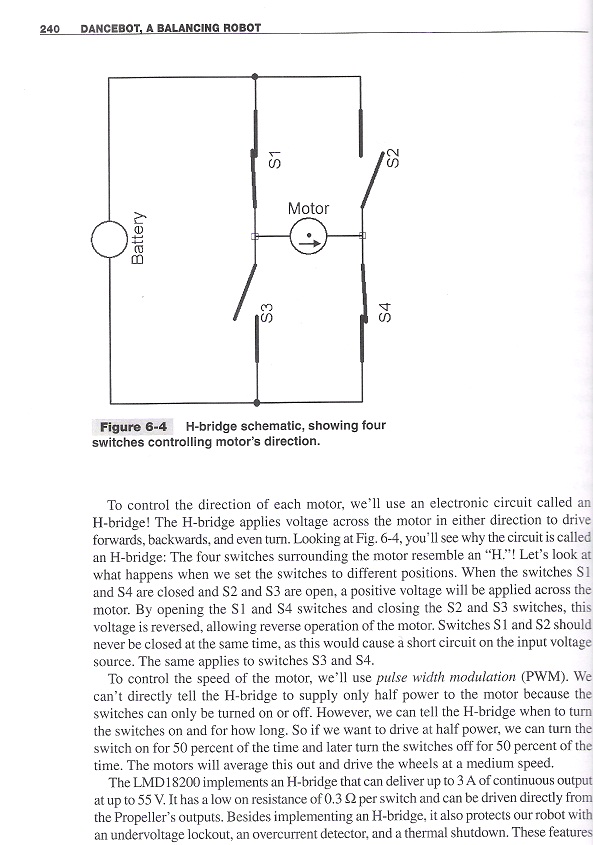'Programming and Customizing the Multicore Propeller Microcontroller' Book Typo
Hi all, while reading the book last night i run across a typo on page 240 in chapter 6. it has a diagram for an H-bridge (fig 6-4) and the text below it states that s1 and s2 or s3 and s4·should never be closed at the same time as this would cause a short circuit, i believe this should be 's1 and s3 or s2 and s4' as per the schematic, this would cause a short circuit.




Comments
Since documentation is a huge asset in Parallax we commend you in bringing anything like this to our attention.
▔▔▔▔▔▔▔▔▔▔▔▔▔▔▔▔▔▔▔▔▔▔▔▔
Ken Gracey
Parallax Inc.
Follow me at http://twitter.com/ParallaxKen for some insider news.
That makes sense to me, but I'm a novice at this - exactly the kind of person who needs this kind of thing to be correct (thanks, KF4). I'll scribble the correction into my book if you're confirming that it should be 's1 and s3 or s2 and s4', as KF4IXM suggests. ·
yes, it IS a typo.
Just have a look at the schematic, and see what would happen when you close S1 and S3 at the same time: the battery will be shorted. The same is true when you close S2 and S4 at the same time, so don't ever do it!
▔▔▔▔▔▔▔▔▔▔▔▔▔▔▔▔▔▔▔▔▔▔▔▔
Greetings from Germany,
G
Thanks.
Maybe Toyota could learn from this example.
▔▔▔▔▔▔▔▔▔▔▔▔▔▔▔▔▔▔▔▔▔▔▔▔
·"If you build it, they will come."
Indeed ....lol.
▔▔▔▔▔▔▔▔▔▔▔▔▔▔▔▔▔▔▔▔▔▔▔▔
'Necessity is the mother of invention'
'Those who can, do.Those who can’t, teach.'
'Convince a man against his will, he's of the same opinion still.'
·
"The car in front is a Toyota, expect long delays"
http://www.nytimes.com/2010/03/11/opinion/11schmidt.html
Of course I don't know the little details, but the mere fact that there have been so many reports of unexpected acceleration in Toyotas doesn't really do much of anything to convince me that there's anything wrong with Toyotas. It seems very possible that what we saw was simply people stomping on the gas in a panic, later swearing (and honestly believing) that they'd been stomping on the brakes, combined with media selective reporting of that problem with Toyotas. Once it becomes "the Story" in the national media, that latter part is almost sure to happen.·Have there been unexpected incidents of acceleration in cars other than Toyotas in the months since the Toyota story broke? I'd bet that there have been (as we've always heard those stories from time to time), but since they didn't fit "the Story", they were not as breathlessly reported as Toyota incidents, and certainly not at the national level. An identified physical issue - like the part that has been replaced in the recall - would convince me of a real problem, except that after the huge uproar in the media, it seems quite possible that was done by Toyota simply to look like they were addressing the problem. Among other things, I have a very hard time believing that it would have taken engineers so long to identify a real problem in so simple a part, even if it were intermittent and dependent upon special conditions.
In short, I think that it's quite possible that Toyota's problem is psychological, not mechanical, a combination of the fact that people are far more fallible than we think they are, and the fact that stories are selectively reported.
Edit: today's NYTimes had letters to the editor in response to that "Braking Bad" column. Two of them were, not surprisingly, from people who objected to the idea that the problems could have been caused by the drivers, but neither of those people had a case. The first was a woman who said that she hadn't caused the problem ("neither my brain nor my foot mistook the brake for the accelerator"). She didn't even try to make a case for her claim - apparently she believes that the fact that she believes it is, itself, evidence that it's true. But of course it isn't.
The second letter said
"While driver error may be the cause of unintended acceleration when drivers are first getting into their cars, it fails to explain the cause of unintended acceleration in all these high-speed cases in the news. Is there something about Toyota drivers that makes them more susceptible to “noisy neuromuscular” episodes than drivers of other makes?"
This person is doubly confused, apparently unaware that there are millions of cars on the road, and that there is selective reporting of stories.
Post Edited (sylvie369) : 3/18/2010 8:26:30 PM GMT